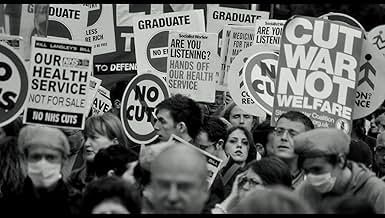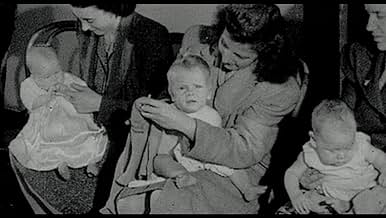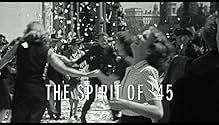AVALIAÇÃO DA IMDb
7,1/10
1,4 mil
SUA AVALIAÇÃO
Adicionar um enredo no seu idiomaA documentary on how the spirit of unity, which buoyed Britain during the war years, carried through to create a vision of a fairer, united society.A documentary on how the spirit of unity, which buoyed Britain during the war years, carried through to create a vision of a fairer, united society.A documentary on how the spirit of unity, which buoyed Britain during the war years, carried through to create a vision of a fairer, united society.
- Prêmios
- 2 indicações no total
Julian Tudor Hart
- Self - General Practitioner
- (as Dr. Julian Tudor Hart)
Harry Keen
- Self - Consultant Physician
- (as Professor Harry Keen)
Jacky Davis
- Self - Consultant Radiologist
- (as Dr. Jacky Davis)
Jonathon Tomlinson
- Self - General Practitioner
- (as Dr. Jonathon Tomlinson)
Avaliações em destaque
Some people have complained that the film is not objective, I think they're missing the point.
The point of this documentary is to capture the essence of that time. What our parents and grandparents had endured and how they faced up to the future with hope for a better world than that passed away with war.
That working together in commonality could build a better world for future generations and they did just that. The achievements of the Atlee government still reverberate down the decades and are with us still.
They did what they did in far harder times than now, are we so useless that we cannot do it?
The point of this documentary is to capture the essence of that time. What our parents and grandparents had endured and how they faced up to the future with hope for a better world than that passed away with war.
That working together in commonality could build a better world for future generations and they did just that. The achievements of the Atlee government still reverberate down the decades and are with us still.
They did what they did in far harder times than now, are we so useless that we cannot do it?
Why did Churchill lose the elections of 1945. Were people simply ungrateful? According to Ken Loach, there were two main reasons. People remembered the misery after WW1 and they had realized that if the state was able to organize the war victory, it should also be able to win victory in peace.
So it came during Clement Attlee; nationalization of health care, of electricity, of the railways, of the coal mines. And at the same time Britain changed into a welfare state.
It's a very effective documentary, but two questions remain unanswered. How was it all financed and why did Churchill come back in 1951? Anyway, it's refreshing to watch how politics once was in charge.
So it came during Clement Attlee; nationalization of health care, of electricity, of the railways, of the coal mines. And at the same time Britain changed into a welfare state.
It's a very effective documentary, but two questions remain unanswered. How was it all financed and why did Churchill come back in 1951? Anyway, it's refreshing to watch how politics once was in charge.
"The Spirit of '45" reminds us of the air of progress occurring in British politics immediately after World War II. It takes back to the founding of welfare state and the nationalization of the health service, transport, energy and other areas of public life. The faces we see at the beginning of the film of young Britons celebrating in the fountains at Trafalgar Square symbolize the hope of a nation. But Loach is also worried about the spirit of modern Britain. The second part ponders a different mood than the one of the 1940s: Thatcherism and the more recent failures of organized labor to live up to its founding principles. On the whole this is a tender and humane film, a compelling mix of interviews, with archive footage. The film works all at once as a lament, a celebration and a wake- up call to modern politicians, it's only a bit boring.
THE SPIRIT OF 45 goes back to the end of the Second World War to recreate the unique spirit of that era, when it really did seem as if a new order had been set up in Great Britain, one dedicated to everyone working for each other rather than out to make individual profits. Industries were nationalized with the aim of securing viable investment, the National Health Service offered medical care at point of contact for everyone, while the government of the time dedicated itself for everyone rather than simply appealing to rich interests. With the help of archive film plus testimonies from those who were around the period, Ken Loach evokes a unique spirit, one which has not existed either before or after that period.
Within those terms, the film is a nostalgic piece which makes some important points about people's capacity to change things, if they really want to. But unfortunately Loach veers off his theme when he introduces Margaret Thatcher into the proceedings. It is true that she ushered in a new area of capitalism and selling off state industries to the highest bidder, but we have to remember the size of her victories, which suggest that a substantial slice of the working classes actually voted for her, in spite of the fact that she was working against their interests. What the film illustrates above anything else is the limitation of communal activity, especially when voters are swayed by the prospect of increased wealth through private enterprise - for example, by being given the chance to buy their council houses. It might not be ethically fair, especially for those too poor to accomplish this, but people basically think for themselves first and their fellow-citizens later. In a sense we were responsible for creating a capitalist world; Mrs. Thatcher only offered the conditions.
With this in mind, a lot of the second half of THE SPIRIT OF '45 is largely rubbish, the product of a mind that consciously misreads British history and simply blames the government for all of our problems, rather than ourselves. On the other hand I applaud Loach for advocating this view, for it is only by appreciating its limitations that we can understand that we are responsible for our own demise.
Within those terms, the film is a nostalgic piece which makes some important points about people's capacity to change things, if they really want to. But unfortunately Loach veers off his theme when he introduces Margaret Thatcher into the proceedings. It is true that she ushered in a new area of capitalism and selling off state industries to the highest bidder, but we have to remember the size of her victories, which suggest that a substantial slice of the working classes actually voted for her, in spite of the fact that she was working against their interests. What the film illustrates above anything else is the limitation of communal activity, especially when voters are swayed by the prospect of increased wealth through private enterprise - for example, by being given the chance to buy their council houses. It might not be ethically fair, especially for those too poor to accomplish this, but people basically think for themselves first and their fellow-citizens later. In a sense we were responsible for creating a capitalist world; Mrs. Thatcher only offered the conditions.
With this in mind, a lot of the second half of THE SPIRIT OF '45 is largely rubbish, the product of a mind that consciously misreads British history and simply blames the government for all of our problems, rather than ourselves. On the other hand I applaud Loach for advocating this view, for it is only by appreciating its limitations that we can understand that we are responsible for our own demise.
Might go a little over the top on its conclusions, but it is an important reminder of a spirit of the time portrayed in the documentary.
In a time when Friedman's free market theory dangerously veers towards anarcho-capitalism, it might not be bad to remember that politics and states should still have a say on our society.
Unfortunately, 'The Spirit of '45' might seem a little bit too much like socialist propaganda, in spite of Ken Loach's intentions of trying to stick to the overall zeitgeist of the British society of the time. Deserves recognition, nonetheless, for having the courage of revealing the colour of its flag, in a business where every film is built to be as inocuous and mass-appealing as possible.
In a time when Friedman's free market theory dangerously veers towards anarcho-capitalism, it might not be bad to remember that politics and states should still have a say on our society.
Unfortunately, 'The Spirit of '45' might seem a little bit too much like socialist propaganda, in spite of Ken Loach's intentions of trying to stick to the overall zeitgeist of the British society of the time. Deserves recognition, nonetheless, for having the courage of revealing the colour of its flag, in a business where every film is built to be as inocuous and mass-appealing as possible.
Você sabia?
- Citações
Self - General Practitioner: It wasn't only "never again" about war. It was "never again" about that kind of peace where everything was run by rich people for rich people.
- ConexõesFeatured in Lasciateci fare Vol. 1 (2015)
Principais escolhas
Faça login para avaliar e ver a lista de recomendações personalizadas
- How long is The Spirit of '45?Fornecido pela Alexa
Detalhes
- Data de lançamento
- País de origem
- Centrais de atendimento oficiais
- Idioma
- Também conhecido como
- O Espírito de 45
- Locações de filme
- Liverpool, Merseyside, Inglaterra, Reino Unido(archive footage)
- Empresas de produção
- Consulte mais créditos da empresa na IMDbPro
Bilheteria
- Faturamento bruto mundial
- US$ 488.854
- Tempo de duração1 hora 34 minutos
- Cor
- Mixagem de som
Contribua para esta página
Sugerir uma alteração ou adicionar conteúdo ausente

Principal brecha
By what name was O Espírito de 45' (2013) officially released in Canada in English?
Responda
















